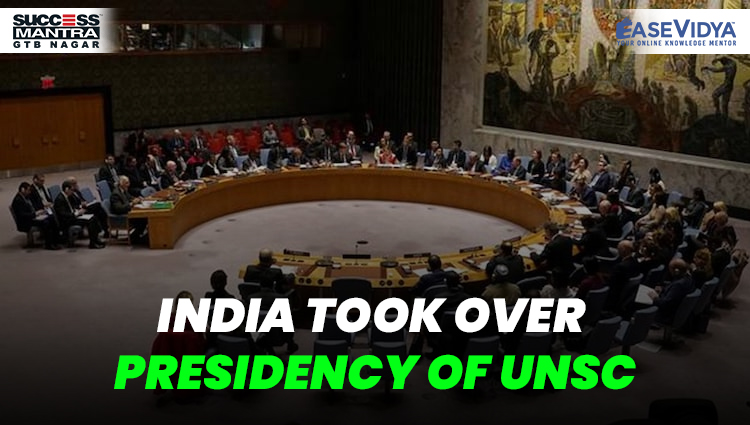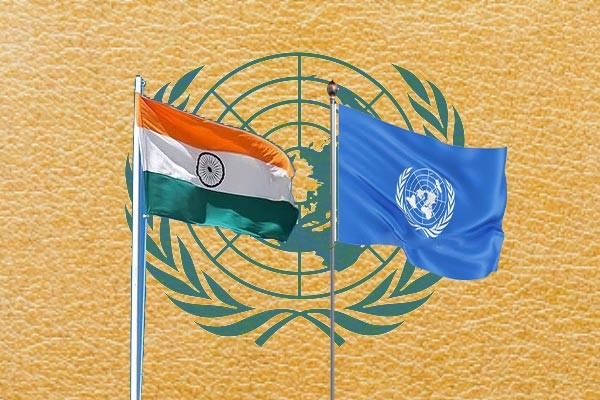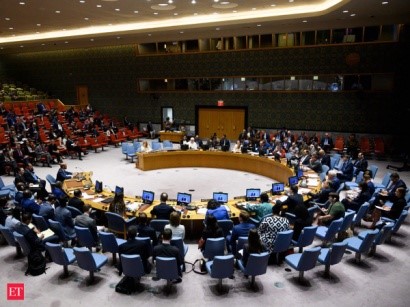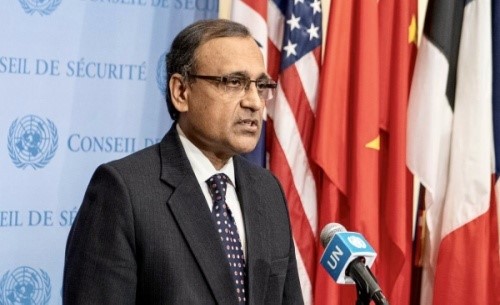
PERMANENT SEAT FOR INDIA IN UNSC
PERMANENT SEAT FOR INDIA IN UNSC

In the past, the Obama and Trump administrations had supported a permanent seat for India on the United Nations Security Council (UNSC). However, the recent statements by the State Department under the new US President Joe Biden, reflects an ambiguous or half-hearted view on this issue.
HIGHLIGHTS OF THE RECENT VIEWPOINT
- The US supports a reformed Security Council that is representative, that is effective, and that is relevant. However, the US offers qualified support for building a consensus for enlargement of the UNSC – in terms of permanent and non-permanent members. The US would not support an expansion of the veto, which is currently exercised by five permanent members (P-5): China, France, Russia, the UK and the US. Also, the US's Ambassador to the UN, had refrained from saying the US supported India and other members of the G4 (Japan, Germany and Brazil) for a permanent UNSC seat. It cited the regional disagreements by the Uniting for Consensus (UFC) group – Pakistan, South Korea, Italy and Argentina – which opposes the G4 plan.
- Need for UNSC Reforms: Undemocratic Nature of UNSC: Barring two regions (North America and Europe), other regions are either underrepresented (like Asia) or not represented at all (Africa, Latin America and the Small Island developing states).
- Misuse of Veto Power: The veto power is used by P-5 countries to serve the strategic interest of themselves and their allies. For example, the United States has casted a veto on Council resolutions 16 times, to support its ally Israel, concerning Israeli-Palestinian conflict.
- Lack of Global Governance: There are no regulatory mechanisms for global commons like the Internet, Space, High Seas (beyond one’s EEZ-exclusive economic zone). Also, there is no unanimity on how to deal with global issues like terrorism, climate change, cybersecurity and public health (as seen in the current pandemic). Due to all these factors, the former UN Secretary-General Kofi Annan said that the Security Council must either reform or risk becoming increasingly irrelevant.
CASE FOR PERMANENT MEMBERSHIP OF INDIA

- India’s Historic Association with the UN System: India is the founding member of the UN. India, till now has been elected for eight terms for a two-year non-permanent member seat. Most significantly, India has almost twice the number of peacekeepers deployed on the ground than by P5 countries.
- India’s Intrinsic Value: India being the largest democracy and second-most populous country (soon to become most populous) in the world, are the primary reasons for it to be granted permanent membership in UNSC. Also, India is one of the largest economies and fastest-growing economies of the world.
- India’s Geopolitical Footprint: India's acquired status of a Nuclear Weapons State (NWS) in May 1998 also makes India a natural claimant as a permanent member similar to the existing permanent members who are all Nuclear Weapon States. Also, India has been inducted in various export control regimes like MTCR, Wassenaar arrangement, etc. India’s international profile and capabilities rise due to its ever-expanding global footprint in diverse areas like politics, sustainable development, economics, and culture and science and technology.
- Representing the developing World: India is the undisputed leader of the Third world countries, as reflected by its leadership role in the Non-Aligned Movement.
- In the past, India was offered to join the UNSC by both the superpowers, the US and the then Soviet Union in 1950 and in 1955 respectively. However, India denied the offer due to Cold war politics in that era. India is currently (in 2021 and 2022) a non-permanent member of the UNSC and is president for the month of August.
- RoadBlocks in India’s Bid for Permanent
MEMBERSHIP
It is argued by critics that India has still not signed the Nuclear Non-Proliferation Treaty (NPT) and also refused to sign the Comprehensive Nuclear-Test-Ban Treaty in 1996. China, which has veto power in the UNSC being one of its five permanent members, has been stonewalling India's efforts to become a permanent member. Though India is a bright spot in the global economy and its macroeconomic fundamentals are stable, it shows poor performance in many socio-economic indicators like the Human Development Index. India’s capacity to project its military power beyond the Indian Ocean region is still to be tested. Further, India heavily relies on weaponry imports from US and Russia for its military requirements.
INDIA TOOK OVER PRESIDENCY OF UNSC

Recently, India assumed the presidency of the United Nations Security Council (UNSC) for the month of August 2021. This will be the country’s first presidency during its 2021-22 tenure as a non-permanent member of the Security Council. India began its two-year tenure as a non-permanent member of the UNSC in January 2021. This is India's eighth term on the UNSC. India assumed the presidency of the United Nations Security Council (UNSC) on August 1, 2021. India took over the rotational presidency of the 15-nation UNSC from France. Indian Ambassador to the United Nations, TS Tirumurti thanked France Permanent Representative to the UN, Nicolas de Riviere, for steering the UN Security Council for July month.
INDIA'S ASSUMED UNSC PRESIDENCY
India will decide the UN body’s agenda for the month and coordinate important meetings on a range of issues. It is going to organise key events in three major areas of maritime security, peacekeeping and counter-terrorism. The Security Council will also have on its agenda several important meetings including Syria, Iraq, Somalia, Yemen, and the Middle East. The Security Council will also be adopting important resolutions on Somalia, Mali, & United Nations Interim Force in Lebanon. Prime Minister (PM) Narendra Modi will be the first Indian PM to preside over a meeting of the UNSC. The last time an Indian PM was engaged in this effort was the then PM PV Narasimha Rao in 1992 when he attended a UNSC meeting.
Support from France & Russia: France has stated that it is dedicated to collaborating with India over strategic problems such as maritime security, peacekeeping, and counter-terrorism. Russia welcomed the country gaining the UNSC presidency saying it is very impressed by India’s agenda, which embraces critical global concerns.
TEST YOURSELF
Q.1 The State Department under which of the following US Presidents, reflects an ambiguous or half-hearted view on the issue of India's permanent membership at UNSC?
- Donald Trump Administration
- Barack Obama Administration
- Joe Biden Administration: ANSWER
- None of the following
Q.2 The veto power in the United Nations is used by P-5 countries to serve the strategic interest of themselves and their allies. Which of the following countries is not a part of P-5?
- Russia
- China
- United States of America
- Germany: ANSWER
Q.3 India took over the presidency of the United Nations Security Council (UNSC) by taking over which of the following nations?
- United Arab Emirates
- Japan
- France: ANSWER
- Saudi Arabia
Q.4 Consider the given options & state which of the following is the current Indian Ambassador to the United Nations?
- Syed Akbaruddin
- TS Tirumurti: ANSWER
- Harsh Vardhan Shringla
- None of the above
Q.5 Which of the following statements is/are incorrect in the reference to the United Nations Security Council (UNSC)?
- The Security Council was established by the UN Charter in 1951. It is one of the six principal organs of the United Nations: ANSWER
- Its primary responsibility is to work to maintain international peace and security.
- The council has 15 members: the five permanent members and 10 non-permanent members elected for two-year terms.
- All of the above












lonpfjbho
PERMANENT SEAT FOR INDIA IN UNSC | Read Daily Article Editorials Only On Success Mantra Blog | Daily Article | Monthly Article | Weekly Article | Yearly Article | Most Requesting Articles | Legal Awareness Articles | Current Affairs | Passage Based Current Affairs | One Linear Current Affairs | Current Affairs For CLAT | Current Affairs For AILET | Current Affairs For Slat | Legal Aptitude Current Affairs | Law Current Affairs | Current Event | Current Affairs Pdf | Current Affairs Pdf In English | Current Affairs Pdf Free Download | Current Affairs MCQ | Current Affairs MCQS | Current Affairs Work Sheet | Current Affairs UPSC | Current Affairs BBA | Current Affairs BCA | Current Affairs BJMC | Current Affairs NCHMJEE | Daily Editorial | Monthly Editorial | Weekly Editorial | Yearly Editorial | Most Asking Editorials | Legal Awareness Editorials | Current Editorial | Passage Based Current Editorial | One Linear Current Editorial | Current Editorial For CLAT | Current Editorial For AILET | Current Editorial For Slat | Legal Aptitude Current Editorial | Law Current Editorial | Current Event | Current Editorial Pdf | Current Editorial Pdf In ENGLISH | Current Editorial Pdf Free Download | Current Editorial MCQ | Current Editorial MCQS | Current Editorial Work Sheet | Current Editorial UPSC | Current Editorial BBA | Current Editorial BCA | Current Editorial BJMC | Current Editorial NCHMJEE | Latest News In India | Latest News In Hindi | Latest News Delhi | Latest News Today India | Latest News Live | 3 Latest News | Latest News Today Delhi | Latest News Aajtak | News Articles India | News Articles For Students | News Articles 2020 | News Articles In English | News Articles In Hindi | News Article Example | Short News Articles | News Article Meaning | Success Mantra Delhi | CLAT Coaching In Delhi | Best CLAT Du LLB Institute In Delhi | Read Daily Article Editorials Only On Success Mantra Blog lonpfjbho http://www.g4y5g7nd87z38k3w4tmp9j640b224ktqs.org/ [url=http://www.g4y5g7nd87z38k3w4tmp9j640b224ktqs.org/]ulonpfjbho[/url] <a href="http://www.g4y5g7nd87z38k3w4tmp9j640b224ktqs.org/">alonpfjbho</a>
cisbswxdxr
PERMANENT SEAT FOR INDIA IN UNSC | Read Daily Article Editorials Only On Success Mantra Blog | Daily Article | Monthly Article | Weekly Article | Yearly Article | Most Requesting Articles | Legal Awareness Articles | Current Affairs | Passage Based Current Affairs | One Linear Current Affairs | Current Affairs For CLAT | Current Affairs For AILET | Current Affairs For Slat | Legal Aptitude Current Affairs | Law Current Affairs | Current Event | Current Affairs Pdf | Current Affairs Pdf In English | Current Affairs Pdf Free Download | Current Affairs MCQ | Current Affairs MCQS | Current Affairs Work Sheet | Current Affairs UPSC | Current Affairs BBA | Current Affairs BCA | Current Affairs BJMC | Current Affairs NCHMJEE | Daily Editorial | Monthly Editorial | Weekly Editorial | Yearly Editorial | Most Asking Editorials | Legal Awareness Editorials | Current Editorial | Passage Based Current Editorial | One Linear Current Editorial | Current Editorial For CLAT | Current Editorial For AILET | Current Editorial For Slat | Legal Aptitude Current Editorial | Law Current Editorial | Current Event | Current Editorial Pdf | Current Editorial Pdf In ENGLISH | Current Editorial Pdf Free Download | Current Editorial MCQ | Current Editorial MCQS | Current Editorial Work Sheet | Current Editorial UPSC | Current Editorial BBA | Current Editorial BCA | Current Editorial BJMC | Current Editorial NCHMJEE | Latest News In India | Latest News In Hindi | Latest News Delhi | Latest News Today India | Latest News Live | 3 Latest News | Latest News Today Delhi | Latest News Aajtak | News Articles India | News Articles For Students | News Articles 2020 | News Articles In English | News Articles In Hindi | News Article Example | Short News Articles | News Article Meaning | Success Mantra Delhi | CLAT Coaching In Delhi | Best CLAT Du LLB Institute In Delhi | Read Daily Article Editorials Only On Success Mantra Blog cisbswxdxr http://www.gi350ofwbag52j594zpb04l6w09l7w73s.org/ [url=http://www.gi350ofwbag52j594zpb04l6w09l7w73s.org/]ucisbswxdxr[/url] <a href="http://www.gi350ofwbag52j594zpb04l6w09l7w73s.org/">acisbswxdxr</a>
fxxntyvv
PERMANENT SEAT FOR INDIA IN UNSC | Read Daily Article Editorials Only On Success Mantra Blog | Daily Article | Monthly Article | Weekly Article | Yearly Article | Most Requesting Articles | Legal Awareness Articles | Current Affairs | Passage Based Current Affairs | One Linear Current Affairs | Current Affairs For CLAT | Current Affairs For AILET | Current Affairs For Slat | Legal Aptitude Current Affairs | Law Current Affairs | Current Event | Current Affairs Pdf | Current Affairs Pdf In English | Current Affairs Pdf Free Download | Current Affairs MCQ | Current Affairs MCQS | Current Affairs Work Sheet | Current Affairs UPSC | Current Affairs BBA | Current Affairs BCA | Current Affairs BJMC | Current Affairs NCHMJEE | Daily Editorial | Monthly Editorial | Weekly Editorial | Yearly Editorial | Most Asking Editorials | Legal Awareness Editorials | Current Editorial | Passage Based Current Editorial | One Linear Current Editorial | Current Editorial For CLAT | Current Editorial For AILET | Current Editorial For Slat | Legal Aptitude Current Editorial | Law Current Editorial | Current Event | Current Editorial Pdf | Current Editorial Pdf In ENGLISH | Current Editorial Pdf Free Download | Current Editorial MCQ | Current Editorial MCQS | Current Editorial Work Sheet | Current Editorial UPSC | Current Editorial BBA | Current Editorial BCA | Current Editorial BJMC | Current Editorial NCHMJEE | Latest News In India | Latest News In Hindi | Latest News Delhi | Latest News Today India | Latest News Live | 3 Latest News | Latest News Today Delhi | Latest News Aajtak | News Articles India | News Articles For Students | News Articles 2020 | News Articles In English | News Articles In Hindi | News Article Example | Short News Articles | News Article Meaning | Success Mantra Delhi | CLAT Coaching In Delhi | Best CLAT Du LLB Institute In Delhi | Read Daily Article Editorials Only On Success Mantra Blog fxxntyvv http://www.g8fb29zj9253lzz7yxp728by7545el8xs.org/ [url=http://www.g8fb29zj9253lzz7yxp728by7545el8xs.org/]ufxxntyvv[/url] <a href="http://www.g8fb29zj9253lzz7yxp728by7545el8xs.org/">afxxntyvv</a>
zxdeckhztk
Latest News on Education & LAW Exams Blogs | Success Mantra zxdeckhztk http://www.gjit018e42gvy88t414t79t6s2wr53ocs.org/ [url=http://www.gjit018e42gvy88t414t79t6s2wr53ocs.org/]uzxdeckhztk[/url] <a href="http://www.gjit018e42gvy88t414t79t6s2wr53ocs.org/">azxdeckhztk</a>
vqsgmsible
Latest News on Education & LAW Exams Blogs | Success Mantra [url=http://www.g43a3t8085d3cmd5g4zch8up6q9r88k5s.org/]uvqsgmsible[/url] <a href="http://www.g43a3t8085d3cmd5g4zch8up6q9r88k5s.org/">avqsgmsible</a> vqsgmsible http://www.g43a3t8085d3cmd5g4zch8up6q9r88k5s.org/